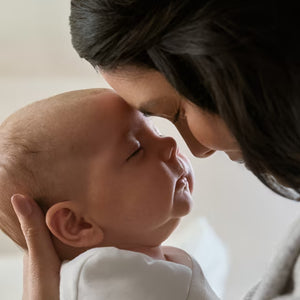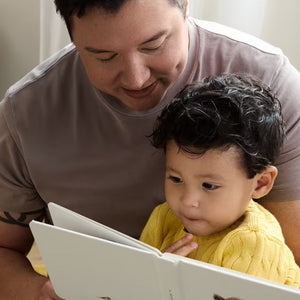Eleven months is an exciting time for you and your baby! They are making giant developmental strides, and you may be noticing some changes in their sleep. Let’s talk about the most frequent questions I get about eleven month old sleep schedules, naps, sleep regressions, and more.
11 Month Sleep Schedule Guidelines
Every baby is unique and your little one’s day will depend on when your baby wakes, how long your baby naps, and individual cues. These age-appropriate guidelines are not intended to be a rigid schedule, simply a guide for setting up a flexible routine.

Text version of 11 month sleep guidelines
| Daytime Feedings: | Every 2.5-3.5 hours |
|---|---|
| Goal Daytime Sleep: | 2.5-3 hours |
| Sweet Spot Bedtime: | 7:00-8:00 pm |
| Number of Naps: | 2 |
| Wake Windows: | 3-4 hours |
For more details on these recommendations, keep reading.
What is a sample schedule for an 11 month old baby?
11 month old schedules are becoming more consistent, but continue to be responsive to the time a baby wakes in the morning, feedings, nap lengths, and wake windows. Each day may look slightly different. Here’s one example of how a schedule might play out for an eleven month old:

Text version of 11 Month Old Sample Schedule
| Time | Activity |
|---|---|
| 6:00 am | Wake |
| 6:05 am | Feeding (breast/bottle) |
| 7:00 am | Breakfast (solids) |
| 8:55 am | Feeding (breast/bottle) |
| 9:05 -10:35 am | Nap 1 |
| 12:00 pm | Feeding (breast/bottle) |
| 1:00 pm | Lunch (solids) |
| 1:50-3:20 pm | Nap 2 |
| 3:30 pm | Feeding (breast/bottle) |
| 5:00 pm | Dinner (solids) |
| 6:40 pm | Feeding (breast/bottle) |
| 7:00 pm | Bedtime |
What are the wake windows for an 11 month old baby?
Wake windows at this age are typically between 3-4 hours.
A general daily routine for an 11 month old could look like this:
-
About 3 hours after Wake Time = Nap 1
-
About 3-3.5 hours after the end of Nap 1 = Nap 2
-
About 3.5-4 hours after the end of Nap 2 = Bedtime
How many naps should an 11 month old take?
At eleven months, our goal for daytime sleep is two naps totaling about 2.5-3 hours.
For each nap, we want to aim for at least 1 hour, but not more than 2 hours. Keeping a nap under 2 hours is helpful because it allows enough opportunity for active awake time, provides adequate time for feedings, and helps keep bedtime in the sweet spot between 7:00-8:00 pm.
If your eleven month old is only taking short naps, my Conquering Naps class can help.
A Note for Daycare Parents: I understand that you may not have much control over naps at daycare. Your provider may transition your eleven month old to one nap prior to their first birthday. Although this is very early for most babies, please trust that your daycare can handle it. Your baby may still need 2 naps while at home; this is perfectly fine. Check out this blog on Daycare and Baby Sleep for more help with daycare naps.
Why is my 11 month old fighting naps? Is my 11 month old baby ready to drop a nap?
Quite a few babies begin to fight naps around 11-12 months. Babies this age are so busy! They are moving around and growing more interested in the world around them. With so much development happening, we often see a disruption in sleep.
Perhaps you’re seeing that your baby is:
-
Taking longer to fall asleep at nap time
-
Not staying asleep as long for naps
-
Experiencing more wakings during naps
-
Completely refusing a nap altogether
Even if you see these signs, it’s unlikely that your 11 month old is ready to drop a nap. Here’s why: In order to successfully transition to one nap, a baby needs to handle wake windows of about 5-6 hours before the nap and 4-5 hours after the nap without being overtired. Most 11 month olds just aren’t able to do so. If we transition to one nap too early, we often see other sleep issues, like night wakings or early morning wakings.
Instead of dropping a nap, consider these questions:
-
Do they need to be on the longer end of the wake window range for this age?
-
Do you have a consistent nap routine? This helps cue your little one’s brain for sleep.
-
Do you need to adjust your baby's total daytime sleep?
-
Do you have a consistent and holistic plan to follow?
What time should an 11 month old go to bed?
I recommend a bedtime between 7:00-8:00 pm to help your eleven month old fall asleep and stay asleep. I have found that a bedtime in this range really helps minimize sleep disruptions overnight.
If your baby is going to bed after 8:00 pm and getting 10-12 hours of consolidated sleep, that’s great! There’s no need to make any changes. But, if bedtime is after 8:00 pm, and your little one is having false start bedtimes, fighting bedtime, waking multiple times during the night, or waking before 6:00 am, consider moving bedtime a bit earlier for a few weeks to see if it helps.
On occasion, we do need to shift bedtime before 7:00 pm. Here are some reasons I may suggest it:
-
Your baby refused a nap.
-
Your baby took a very short nap.
-
Your baby got less than 2-2.5 hours of total daytime sleep.
-
Your baby is really having a hard time making it to bedtime (after being awake at least 3.5 hours from the end of the second nap)
Having a predictable bedtime routine can be so helpful for bedtime success. See the blog Creating a Bedtime Routine if you’re not sure where to start.
How long should an 11 month baby sleep at night?
We want to aim for 10-12 hours of overnight sleep and 2 naps totaling about 2.5-3 hours. Our goal is 13-15 hours of total sleep in a 24-hour period. Babies who are on the higher end of the range for night sleep are often on the lower end of the range for daytime sleep and vice versa.
If 13-15 hours of restful sleep seems impossible with your little one, please know I can help. My 5-24 Month Collection will give you a holistic, step-by-step, and fully-customizable plan to set you up for sleep success for days, nights, and every bump along the way.
What are some 11 month old milestones?
When your baby is eleven months old, they may be:
-
Cruising along furniture
-
Standing without assistance or taking a few steps
-
Saying a few familiar words, like “mama,” “dada,” “baba”
-
Trying to communicate using hand movements
-
Throwing or trying to throw objects
-
Finding hidden objects (ex: hiding a toy under a blanket, they know to look under the blanket for their toy)
-
Showing more independence with self feeding
Please know, every baby develops at their own individual pace, and your baby may experience these milestones before or after 11 months. Be sure to speak with your pediatrician if you have any concerns about your baby meeting their milestones.
Is there an 11 month sleep regression?
There can be! We typically see sleep regressions around 8-10 months and around 12 months. Since 11 months falls right in between those sleep regressions, I do see some babies struggle with sleep at this age. You may also be seeing changes in your 11 month old’s sleep because your baby is:
-
Experiencing a peak in separation anxiety.
-
Needing slightly longer wake windows.
-
Learning new skills.
Expert Tip: The best way to minimize sleep disruptions during a regression is to implement a consistent approach to sleep.
What are some activities I can do with my 11 month old?
You’ve probably noticed your eleven month old baby is showing more interest in what you’re doing and wanting to be a part of everything. They’re more mobile than ever and showing better coordination. Here are a few ideas for activities to do with your 11 month old:
-
Encourage mobility by supervising your baby cruising along the sofa.
-
Try an activity walker to get your baby moving as they practice standing up and pushing it along.
-
Promote hand-eye coordination by rolling a ball back and forth with your baby.
-
Build on your baby’s understanding of object permanence by hiding objects under small boxes or containers or consider toys that demonstrate object permanence.
-
Offer toys that allow your baby to imitate you like a toy phone.
-
Create a safe space in the kitchen for your baby to explore, like a bottom drawer with plastic containers and measuring cups.
-
Turn on the music and have a dance party! Let your baby make music by drumming on a bowl with a spoon (This helps with hand-eye coordination too and can be a great tool for stretching those wake windows.).
If you need more inspiration for your 11 month old, I have some favorite toys here.
Why is my 11 month old waking up at night crying?
If your 11 month old is suddenly waking up at night crying, start by considering whether your little one may have a new physical concern, like teething or illness.
If you've ruled out physical discomfort, consider if your little one:
-
is learning a new skill.
-
dropped a nap too early.
-
needs an adjustment in wake windows or total daytime sleep.
Read Why Won't My Baby Sleeping Through the Night? for more reasons why your 11 month old may be experiencing nighttime struggles.
If your baby has always struggled with waking in the night, please know that I can help. My 5-24 Month Collection will walk you step-by-step through a holistic and emotionally-connected plan to independent nights and naps.
Can I sleep train my 11 month old?
You can! If you decide that you are ready for sleep training, I can help. My 5–24 Month Collection will give you the holistic and fully-customizable plan you need for consolidated nights, solid naps, and all the bumps along the way while remaining emotionally connected to your baby.
Still have a 10 month old? Check out 10 month sleep schedules. Already have a 12 month old? I've got you covered with my 12 month old sleep schedules.








